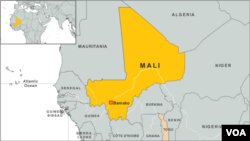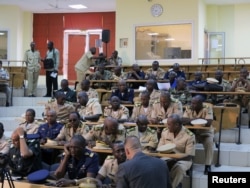DAKAR —
Humanitarian agencies are warning of the many risks to civilians presented by a likely military offensive against al-Qaida-linked extremists in control of northern Mali since April. Their call came as the United Nations Security Council unanimously voted in favor of a phased, African-led military deployment to Mali next year.
Four hundred twelve thousand people have fled their homes in northern Mali since the start of the year as fighting morphed from a Tuareg separatist rebellion in January to an occupation by al-Qaida-linked Islamist militants beginning in April.
Aid agencies said the numbers of displaced and refugees could swell by hundreds of thousands with renewed fighting in 2013.
Ten humanitarian NGO's (Non-governmental agencies) working in Mali issued a joint statement Thursday as the U.N. Security Council gave the green light to a regional military deployment to Mali. The U.N. resolution did not specify when an offensive would happen, though officials have said it would not be before September 2013.
The ten aid groups said the military offensive would have "serious humanitarian consequences and requires serious safeguards" to protect civilians.
World Vision International's Mali Director, Justin Douglass, said the crisis in 2012 already coincided with drought and severe food shortages throughout the Sahel region. "We've had over four million people in Mali who do not have enough food," he said.
"If there's going to be military intervention, the people who will be going ahead with it need to consider the needs of the most vulnerable, especially the women and the children, because they are already under a lot of stress, and to have a military intervention without considering them will just make matters worse," he added.
Douglass said military planners need to make sure that aid agencies can reach civilians fleeing any fighting.
All scenarios appear to remain possible for 2013. Terrorist attacks, further political unrest or a spillover of the conflict into southern Mali or neighboring countries are among the things that could complicate humanitarian response.
Fighting could destroy farmlands and infrastructure. Displacement heightens the risk of a cholera outbreak and puts women and girls in greater danger of sexual violence.
The aid agencies said they support ongoing efforts to negotiate with at least some of the armed groups in the north to find a peaceful and enduring solution to the crisis.
They said the U.N. Security Council must make sure that all troops involved in any internationally backed offensive are trained in international law about human rights and refugees to prevent harm to civilians and their property.
Four hundred twelve thousand people have fled their homes in northern Mali since the start of the year as fighting morphed from a Tuareg separatist rebellion in January to an occupation by al-Qaida-linked Islamist militants beginning in April.
Aid agencies said the numbers of displaced and refugees could swell by hundreds of thousands with renewed fighting in 2013.
Ten humanitarian NGO's (Non-governmental agencies) working in Mali issued a joint statement Thursday as the U.N. Security Council gave the green light to a regional military deployment to Mali. The U.N. resolution did not specify when an offensive would happen, though officials have said it would not be before September 2013.
The ten aid groups said the military offensive would have "serious humanitarian consequences and requires serious safeguards" to protect civilians.
World Vision International's Mali Director, Justin Douglass, said the crisis in 2012 already coincided with drought and severe food shortages throughout the Sahel region. "We've had over four million people in Mali who do not have enough food," he said.
"If there's going to be military intervention, the people who will be going ahead with it need to consider the needs of the most vulnerable, especially the women and the children, because they are already under a lot of stress, and to have a military intervention without considering them will just make matters worse," he added.
Douglass said military planners need to make sure that aid agencies can reach civilians fleeing any fighting.
All scenarios appear to remain possible for 2013. Terrorist attacks, further political unrest or a spillover of the conflict into southern Mali or neighboring countries are among the things that could complicate humanitarian response.
Fighting could destroy farmlands and infrastructure. Displacement heightens the risk of a cholera outbreak and puts women and girls in greater danger of sexual violence.
The aid agencies said they support ongoing efforts to negotiate with at least some of the armed groups in the north to find a peaceful and enduring solution to the crisis.
They said the U.N. Security Council must make sure that all troops involved in any internationally backed offensive are trained in international law about human rights and refugees to prevent harm to civilians and their property.





